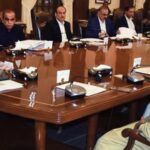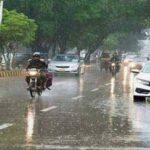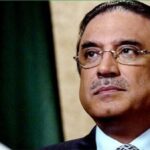MULTAN , May 31 (APP):Foreign Minister Makhdoom Shah Mahmood Qureshi on Sunday said the minorities in Pakistan were fully safe, with their worship places protected while there was grave violation of their rights in India.
The Pakistani government, he said, had formed a minorities commission with representation from all the minority religions and a Hindu citizen Chela Ram Kewlani as its head while the Muslims in India could not say prayers at the 400 years old Babri Mosque, which was demolished by Hindu zealots.
Talking to media persons here at the Saint Mary Church, the minister said he was proud to be present at an historical church that was built in 1848. All the worship places of minorities, including
churches and temples in Pakistan were being protected by the government, but it was not the case in India.
He said setting up the minorities commission under the guidance of the Supreme Court of Pakistan was an an expression of solidarity with all the minorities in the country. It would formulate recommendations about the minorities issues, which would be honoured by the government, he added
On the contrary, he said the India Supreme Court had remained silent over the desecration of Babri Mosque by the RSS and BJP extremists. Now all the minorities, particularly the Muslims were being targetted through the Citizens Act there. The BJP-RSS Hindutva ideology stood exposed before the world. Srinagar’s Jamia Mosque was locked and the Muslims were not allowed to offer prayers there. The worship places of Muslims were not safe in India.
Qureshi said all the minorities in Pakistan had made contributions towards the country’s development. He appreciated the Christian community for its role in promotion of education, health and other sectors. He also hailed the Hindus, who preferred to stay in Pakistan despite having the choice to migrate to India.
He said Prime Minister Imran Khan had opened Kartarpur Corridor as a goodwill gesture to the Sikh community.
The foreign minister said voices were now being raised by Nepal and Bangladesh against India’s hegemonic designs. Kathmando was accusing New Delhi of occupying its land. Similarly, Pakistan was raising the issue of Indian atrocities in the Indian Occupied Jammu and Kashmir (IOJK) and China was fighting with India for its area.
The foreign minister said a message of love for the minorities had always emanated from Pakistan and the opening of the Kartarpur Corridor was its latest example. He welcomed former Indian prime minister Manmoohan Singh when he crossed the border to attend the corridor’s opening ceremony and then saw him off with due respect.
He said Pakistan had highlighted the brutalities on Muslims in India at the human rights meeting in Geneva. He had talked to the United Nations Secretary General in detail before Eid, stressing that the world body should play its role in that regard.
To a question about COVID-19, Qureshi said the pandemic was affecting the whole world. He stressed on a unanimous strategy to combat the pandemic and sought cooperation of provinces.
Thousands of Pakistanis, who were stranded or rendered jobless in foreign countries, he said, had returned to Pakistan so far while the government was making efforts to bring back the rest. The visas of some Pakistani expatriates had expired and the government was trying to get the same extended to save their jobs.
He said a high level meeting on Monday (June 1) would take a decision on self-quarantine, after which the process for return of expatriate Pakistanis would be expedited.
To another question, the minister said said there was negative impact of COVID-19 on the global economy but incumbent government would try its best to provide maximum relief to the masses in the upcoming budget 2020-21.
It had already disbursed Rs 144 billion among 12 million people in a transparent manner through the Ehsaas programme, he said, adding applications were also sought from the unemployed people through Prime Minister Portal to assist them.
He said the prices of petrol and diesel were reduced while the relief in electricity bills was also being given.
Replying to a question, the foreign minister said it was the first government which had made the inquiry commission’s report about the sugar crisis public. After the forensic report, Prime Minister Imran Khan made it clear that those involved would have to be held accountable by the institutions including FBR, FIA and others.
To another question, he said the China-Pakistan Economic Corridor (CPEC) was a game changer and it would be completed at all costs, no matter whether India or any other country liked it or not.
There was a national consensus on it.
About the Ladakh issue, said it was a disputed area and India had started construction there illegally. China had expressed its reservations over the issue and had to take action as India did not pay any heed to its dialogue offer.
To another query, he said the National Assembly session was called on the request of the opposition to discuss the COVID-19 situation, but instead of presenting proposals to contain the contagion, it merely resorted to criticism.
Responding to a question, Qureshi said former prime minister Zulfikar Ali Bhutoo had decided to make Pakistan an atomic power at his uncle’s house in Multan. All the governments continued the nuclear programme process and the Pakistan Army protected it. The credit of making Pakistan an atomic power went to the whole nation not just an individual.
Chairman minorities commission Chela Ram and others were present






